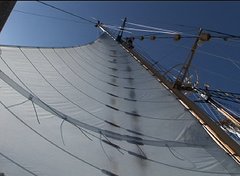The past week of uncommon dialogues
has been brought about some fascinating discussions on the topic of
conservation, covering many points that merit dissemination past the hull of
our wandering ship. As we know, conservation is a group effort, and although
the SSV Seamans is currently carrying a very promising group of individuals, we
can always do better to bring our ideas of sustainability and conservation to
the wider world.
For her uncommon dialogue, Alexis
Woods presented us with a novel, utilitarian view of sustainability. She had us
imagine it was the year 2300 and the world as we know it had been wasted away
by our harmful actions. In order to preserve our species, the remaining humans
set off to a fresh, unexploited planet capable of sustaining life. With this
scenario in mind, Alexis asked us, what should we bring, both in terms of our
practices and our material possessions, to sustain ourselves in this new world?
The class was quick to eliminate all sorts of disposable materials we use
today, but we came to this conclusion in an interesting way. At first, we
decided that bringing plastics of any kind would be a bad idea, but as the
discussion progressed, it was clear that some plastic are extremely useful and
necessary to our society. The question of food was also a point of debate.
Although it was agreed that grains would be extremely useful as a stable food
source, how to go about supplying protein to the population was more
complicated. Bringing livestock seemed the obvious choice but it presented the
problem of the very low caloric return we would receive in exchange for the
food we would have to supply the livestock with. This led to the suggestion
that if we are being purely utilitarian and ignoring factors like preference
and taste, should we do away with animal protein all together and focus only on
plant sourced protein? The practice was a revealing one, posing us with the
question of whether or not true, perfect sustainability is possible without
sacrificing our preferences and pleasures in life.
The
following uncommon dialogue was hosted by Alessandra Santiago. Alessandra talked
to us about using concepts of sociology and anthropology to promote
conservation. Although many of us were familiar with the concept, it is
admittedly one that too often slips from the minds of those absorbed in the
scientific community. In an age when communication of data is arguably becoming
a more dire need than the accumulation of the facts themselves, the powers of
sociology and anthropology can be an extremely powerful tool. Through a few
examples, Santiago reminded us that information is much better received when
delivered in the right cultural context. For example, one Stanford sociologist
studied the most effective ways of disseminating advertisements in Kapmandu and
found that the most frequently viewed form were those aired on karaoke videos. This
example highlights just how drastically things can change across cultural
borders, because as you and I both know, karaoke advertisements would not be
very effective here in the united states. With this in mind, we began
brainstorming the best possible ways of providing the parts of the world that
we do not necessarily fully understand with conservation and sustainability
information. Alessandra’s ideas were received very positively by the group and
we were soon discussing the place of proactive behavior in science. As we
gather information about the instability and frail nature of our planet, is it
our responsibility in turn to do something about it? Or, should the answer to
the problems we as scientists point out be left to a different community to figure
out? In the end the students agreed on one point. What is the point of being a
scientist if you are not part of the change you hope to bring about?
-Lucas Oswald


No comments:
Post a Comment